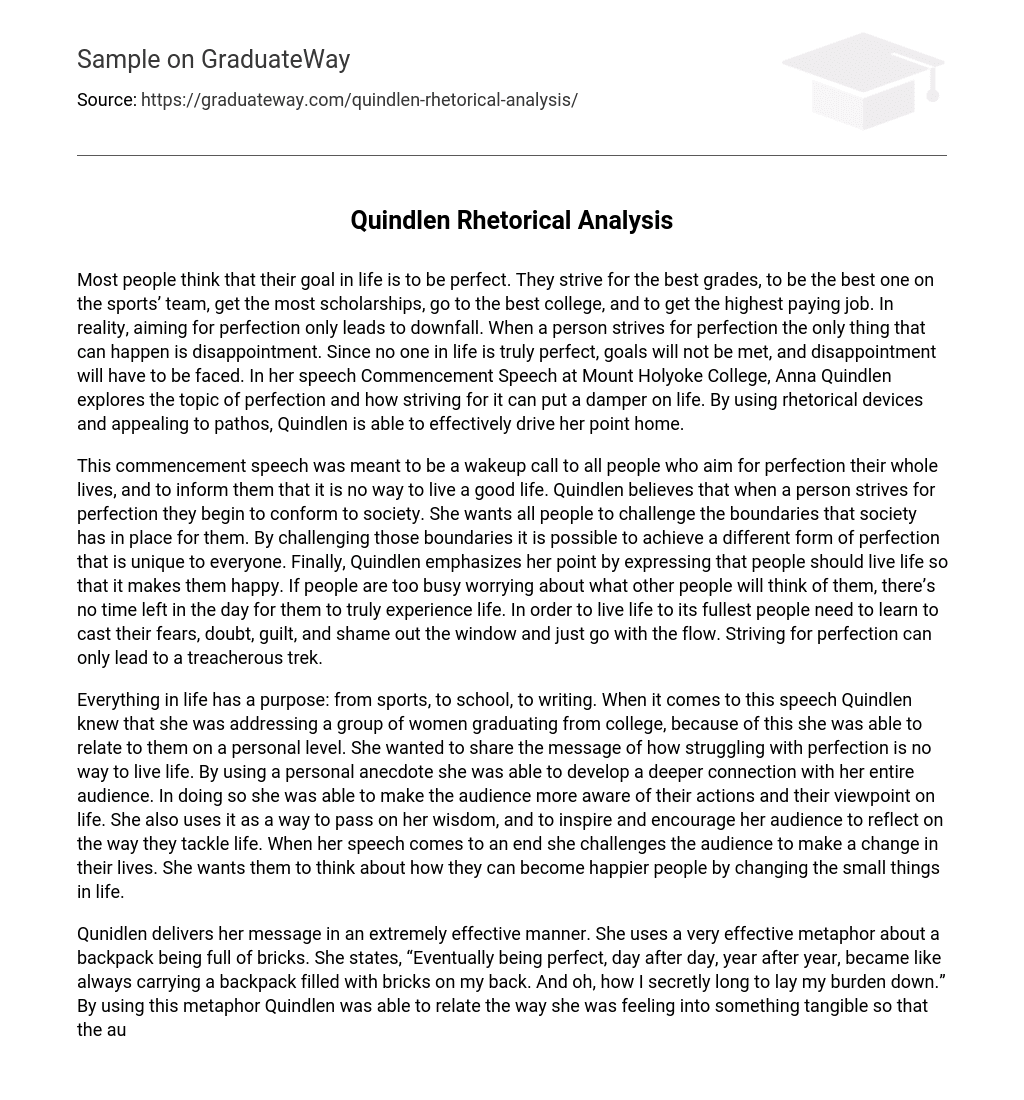The general belief held by most individuals is that attaining perfection is their ultimate life objective. They dedicate themselves to achieving outstanding academic results, excelling in sports teams, acquiring numerous scholarships, gaining admission to prestigious colleges, and securing highly remunerative jobs. However, the realistic outcome of pursuing flawlessness is invariably disheartening. The pursuit of perfection ultimately culminates in disappointment since nobody can truly achieve flawless results in every aspect of their life. Consequently, this leads to unmet goals and the necessity to confront disillusionment. Anna Quindlen, in her Commencement Speech at Mount Holyoke College, delves into the subject of perfection and its detrimental impact on one’s life. Through the implementation of rhetorical devices and appealing to emotions (pathos), Quindlen effectively communicates her message.
The purpose of this commencement speech is to awaken those who seek perfection and demonstrate that it is not a satisfying way to live. Quindlen argues that striving for perfection results in conforming to society’s expectations, urging individuals to push these limits and discover their own distinctive form of perfection. She emphasizes the significance of living a joyful life without concern for others’ opinions. To truly embrace life, people must release their fears, doubts, guilt, and shame and simply go with the flow. Pursuing perfection ultimately leads to a challenging journey.
Quindlen’s speech to a group of college graduates focused on the purpose of everything in life, from sports to school to writing, emphasizing the futility of striving for perfection. To establish a personal connection, she shared a personal anecdote, aiming to raise awareness and inspire reflection among her audience. Quindlen also sought to impart wisdom and encourage positive change in their lives, urging them to consider how small adjustments can lead to greater happiness.
Qunidlen effectively delivers her message through the use of a metaphor comparing her experience to carrying a backpack filled with bricks. This metaphor allows the audience to grasp the intensity of her feelings. By referencing a tangible object like bricks, which everyone knows are heavy, Quindlen ensures the audience understands her message. Additionally, Quindlen’s speech is succinct, preventing the audience from losing interest or getting distracted. A lengthy speech can cause the audience to lose focus, rendering the speaker’s points irrelevant. By keeping her speech short and direct, Quindlen ensures the audience comprehends her message while remaining engaged. Lastly, she employs academic diction, using words like “zeitgeist,” “hubris,” “conical,” and “myriad.” This choice of vocabulary establishes a deeper connection with her educated audience, allowing them to fully understand and appreciate her message.The connection between Quindlen’s speech and its full meaning can be considered esoteric, as it may not be fully understood by “average” individuals without context. Nevertheless, by employing relatable metaphors, being concise, and using academic diction, Quindlen effectively conveys her point to the audience.
Quindlen’s speech about the components of a good life serves as an encouragement for her audience to contemplate their own lives. Her goal is to inspire each graduate with the belief that they can alter their lives before moving forward. Quindlen emphasizes the significance of balance in one’s life, stating that without it, genuine happiness becomes unattainable as individuals become overwhelmed by stress and insignificant matters. Furthermore, she aims to introduce new perspectives to these graduates, exposing them to ideas they may not have previously considered in order to effectively reinforce her message. Through encouraging self-reflection, Quindlen delivers a powerful speech capable of impacting many future generations.





